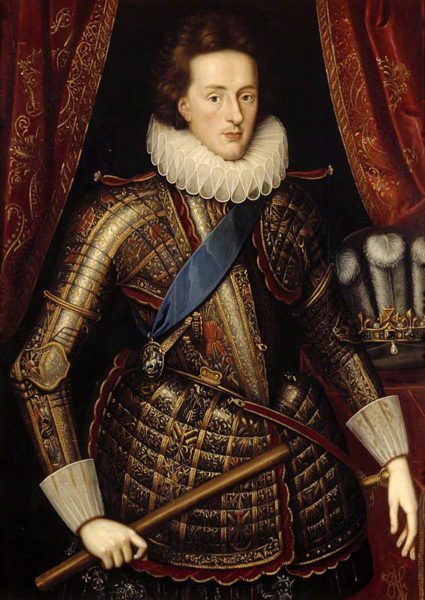In the latest Age of Invention newsletter, Anton Howes considers what might have been had the eldest son of King James I and VI lived to take the thrones of England and Scotland:

Portrait of Prince Henry Frederick (1594-1612), Prince of Wales by Isaac Oliver
National Trust, Dunster Castle; http://www.artuk.org/artworks/prince-henry-frederick-15941612-prince-of-wales-99804 via Wikimedia Commons.
Henry Frederick, Prince of Wales, was the eldest son and heir of James I of England. He would presumably have become Henry IX had he managed to outlive his father. But he died in 1612 aged just 18. The kingdom instead ended up with his younger brother Charles I and civil war. I’m not sure how far Prince Henry was influenced, but it seems that many of the major innovators of the period were purposefully cultivating him as a kind of inventor-scientist king.
It reminds me of a very similar and successful scheme, which I noticed when researching my first book on the history of the Society for the Encouragement of Arts, Manufactures and Commerce. This was the scheme to cultivate George III — famed for his madness and losing the Thirteen Colonies, but also for his collection of scientific instruments and interest in agricultural innovation. Those interests were no accident: his upbringing had included lessons in botany from the inventor Stephen Hales, in art and architecture from William Chambers, and in mathematics from George Lewis Scott. These were not just experts, but active innovator-organisers. Hales was a key founder of the Society of Arts; Chambers helped organise the artists who split off from it to form the Royal Academy of Arts; and Scott was involved in updating Ephraim Chambers’s Cyclopaedia, or Universal Dictionary of Arts and Sciences — an early encyclopaedia focused on technical knowledge. And their efforts bore fruit. Unlike his predecessor and grandfather George II — whose interests mainly fell under the headings of Handel, Hanover, hunting, and heavy women — George III became an active patron of science, invention, and the arts.
Given how successfully the inventors cultivated George III, it makes me wonder how things might have looked had Prince Henry lived to be king. His younger brother Charles I had an education heavily geared towards languages, theology, and overcoming various health issues through sports. But Henry — naturally athletic and charismatic — had an upbringing tightly controlled by Sir Thomas Chaloner, who had a major financial stake in innovation.
Chaloner housed and supported his alchemist cousin (also, confusingly, called Thomas Chaloner). This cousin had published an early treatise on the medical applications of saltpetre, or nitre (what we now call potassium nitrate), and had tried to produce alum on the isle of Lambay, off the coast of Ireland. Alum was a valuable substance used to fix cloth dyes, which had hitherto been monopolised by the Pope, who owned Europe’s only alum mine. Opening a competing, English-controlled, Protestant supply of alum was not just about starting a new industry. It was a matter of Europe-wide religious and strategic urgency.
[…]
Henry’s circle also included the Dutch polymath Cornelis Drebbel, who would become famous all over Europe for travelling in a submarine under the Thames, for his improvements to microscopes, and for inventing a perpetual motion machine (which isn’t as silly as it sounds — it was effectively a kind of barometer, exploiting changes in temperature and air pressure to move).
And that’s just the tip of the iceberg. The more I look into the circle of inventors around Prince Henry, the more familiar names crop up. There even seems to be some connection to Simon Sturtevant, one of the original patentees of a method to make iron by using coal instead of wood — Chaloner was seemingly responsible for evaluating Sturtevant’s inventiveness, to see if he merited a patent. I found it very striking that when Sturtevant’s iron-making business was about to get going, Prince Henry was to have a share.
Given such innovative company, we can only imagine what kind of a king Prince Henry might have been. If George III grew up to be “Farmer George”, might a Henry IX have become associated with navigation or hydraulic engines? We’ll never know. But even during his brief lifetime, there was plenty of patronage to be had for inventors at the court of their would-be Inventor-King.



